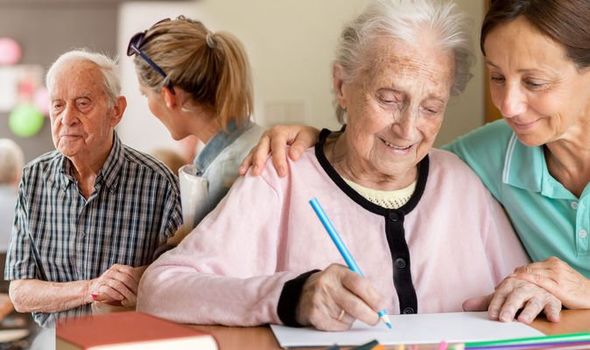Getting the news that a Loved Ones with Dementia can be devastating. Especially, knowing how progressive the disease can be. According to WebMD, the effects of dementia are significant. Once one develops the disease, over time they will suffer from memory loss, changes in behavior and personality, a loss of judgement and reasoning, as well as a physical decline
It is not only scary for the person diagnosed, but also for family members. Seeing your loved one change and become affected by the cognitive disease can be heartbreaking. However, learning dementia care tips help make this difficult time a bit easier.
Tips
The Mayo Clinic provides three main advice tips on how you can make caring for your loved ones with dementia, less strenuous.
Lessen Frustration
When simple tasks that were once easily done, become difficult for your loved one with dementia, they may become agitated. Here are ways you can help reduce that frustration.
- Create a Daily Routine: By establishing a set schedule for your loved one, it will help them feel more secure and ready for the day’s events. Set a certain time to wake up and a time to go to bed. Also try and set specific times for breakfast, lunch and dinner.
- When scheduling doctors appointments, make the time for when your loved one is most awake and alert.
- Be Patient: This is going to be a new adjusted routine and schedule for you and your loved one, so make sure to be patient and allow extra time for certain activities. And take into account that simple tasks may take longer than they did before.
- Include Your Loved One: Let your loved one do aspects as independently as they possibly can. Try to remember this is a big adjustment for them, as they were once independent and didn’t need your help. You can still assist them, but try to make it seem like they are mostly doing things on their own. For example, maybe put the laundry basket in the living room to add a visual cue to let your loved one remember to do laundry.
- Give Them Choices: To give your loved one a level of independence, provide them with small choices throughout the day. This will help them feel like they are more in control of their lives, all while letting you subtly help them. Small choices can include setting out two outfits for the day and letting your loved one choose the one they would like to wear. You can also ask if they would like a sandwich or a salad for lunch.
- Present Clear Instructions: Try your best to provide your loved one with simple, one-step instructions that are easy for them to understand.
- Prevent Napping: Try to limit your loved one from taking long or many naps throughout the day. Limiting them to a strict sleep schedule can help reduce Sundowner’s Syndrome, which causes seniors to become more agitated as the sun goes down, oftentimes due to restlessness.
- Limit Distractions: When trying to communicate or help your loved one, limit any surrounding distractions that could deter the focus away from what you are trying to accomplish.
- Have a Positive Attitude: When caring for your loved one, give them positive affirmations to help improve their mood. Also install positive facial expressions, body language and tone of voice when communicating with them. By having a positive attitude and outlook, it will make the time you are going through a little easier, as well as help your loved one get through their challenges. It will also reassure them that you love and care about them.
- Exercise: During the day, try to keep your loved one active to ensure they are keeping up their physical and mental health. This can include: walking, gardening, dancing or stretching. By doing activities, it can help improve your loved one’s sleep, build balance and help them maintain cognition.
-
- You can also keep your loved one busy by doing crosswords, puzzles, painting, drawing, or reading to improve their cognitive skills.
Safety Precautions
Family Care Alliance (FCA) gives important tips to ensure your loved one’s safety while they are at home.
- Be Proactive to Prevent Wandering: Dementia patients are prone to wander off and could get lost or hurt if not properly supervised. Try your best to keep an eye on them at all times to ensure their safety. In the events that you are not able to keep a close eye on them, install safety measures into their household to prevent them from wandering or injuring themselves.
-
-
- Install a home security system and camera: This will allow you to be alerted if there is movement in the house, and you can keep an eye on your loved one when you are not there.
-
- Install locks on doors to the outside.
-
- Tell their neighbors about your concerns: When you are not able to be physically present with your loved one, alert their neighbors, who are at a closer range to your loved one, about your concerns regarding your loved one. This will let your neighbors look out for any worrisome behaviors or instances and alert you.
- Have your loved one wear an ID bracelet– To be extra precautions, put an ID bracelet with contact information on your loved one’s wrist, or stitch into their clothing. This will help identify them in the event they wander off and allow them to get help as soon as possible.
- Lightning: Place lights in your loved one’s hallway, bedroom, bathroom and other places they may get up to during the night. This will help prevent them from tripping on something and injuring themselves if they have to get up.
- Stairway Gates: If your loved one lives in a home with stairs, block off the stairs at night so they don’t try to wander downstairs in the dark.
The most important thing to remember when caring for your loved one is to be there for them. They are losing their independence and that can be hard for them. Do your best to help them and keep a positive attitude. You both are in this together and you are not alone. Ask for help from family and friends if you need a break. Remember to take care of yourself as well as this will in turn, help you take care of your loved one.











